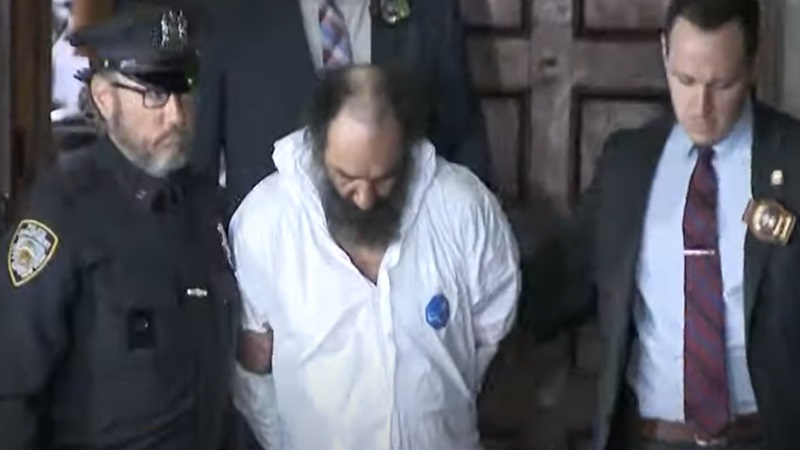
The recent brutal stabbing spree in Manhattan, allegedly committed by Ramon Rivera, 51, is a chilling indictment of our failure to address the intersection of criminality, homelessness, and severe mental illness. Rivera, a career criminal with a well-documented history of violence and mental health issues, was inexplicably released from Rikers Island just a month before the deadly rampage. His case starkly illustrates the devastating consequences of neglecting to intervene with individuals who are a danger to themselves and others.
Rivera’s trajectory is not unique. His long history of arrests, violent behavior, and time in psychiatric care points to a system that repeatedly failed to protect society—or Rivera himself. Yet, instead of meaningful intervention, Rivera’s release reflected a patchwork approach that prioritizes procedural leniency over public safety and human dignity. The mayor’s bewilderment over why Rivera “was on the street” echoes a broader question Americans are asking: why are dangerously ill individuals allowed to spiral into chaos and destruction?
The answer lies in decades of misguided policy and a misplaced emphasis on preserving individual autonomy at all costs. However, it is time we recognize that involuntary mental health commitment, carried out with due process, is not a violation of liberty but a restoration of it for those who cannot make rational decisions about their own care.
The Madness of Neglect
Rivera’s case is emblematic of a system that has all but abdicated its responsibility to protect the public from the violently mentally ill. Released on supervised release after his latest conviction, Rivera wasted no time resuming his pattern of theft and aggression. With a documented history of mental health crises, including assaults on corrections officers and multiple arrests for burglaries and thefts, Rivera demonstrated his inability to live within the bounds of societal norms—or to seek the help he desperately needed. His subsequent rampage should surprise no one.
The broader societal implications of cases like Rivera’s are alarming. According to the Cicero Institute, mental illness is a key driver of the homelessness crisis, with an estimated 21% of the total homeless population suffering from severe mental illness. These individuals are not merely “down on their luck”; they are often trapped in a cycle of untreated psychiatric disorders that render them incapable of functioning independently. Worse still, they are at heightened risk of victimization, arrest, and—in cases like Rivera’s—posing a threat to the community.
Why Involuntary Commitment is the Answer
The resistance to involuntary mental health commitment is rooted in the noble but ultimately misguided belief that preserving personal autonomy should always take precedence. Yet, many individuals suffering from severe mental illness are incapable of recognizing their condition—a phenomenon known as anosognosia. For these individuals, the refusal of treatment is not a matter of choice but a symptom of their disease.
Involuntary commitment offers a pathway to stabilize and rehabilitate. It allows for thorough medical evaluations, immediate treatment, and court-ordered care in a safe environment. This is not about warehousing people but about addressing the root causes of their suffering and protecting society from preventable tragedies.
Importantly, involuntary commitment laws already include robust safeguards to ensure due process. Patients are evaluated by medical professionals, and courts weigh the evidence before authorizing treatment. Yet, states vary widely in their application of these laws. The national average for involuntary commitment is only nine individuals per 1,000 with serious mental illness, leaving many who qualify for treatment to languish untreated.
States must adopt broader criteria, such as the “grave disability” or “need-for-treatment” standards, which recognize that untreated mental illness can be as fatal as active self-harm. In addition, the duration of inpatient care must be sufficient to ensure genuine stabilization. A mere few days of hospitalization does little to address the complex needs of the severely mentally ill.
A Proven Solution
The benefits of involuntary commitment are clear. Studies have shown that states with broader involuntary civil commitment laws experience significantly lower homicide rates. Longer hospital stays have been found to reduce the likelihood of rehospitalization and improve long-term outcomes. For those who do not qualify for inpatient treatment but still require intervention, assisted outpatient treatment (AOT) provides a valuable alternative, reducing hospital readmissions and improving adherence to treatment plans.
Contrary to the claims of skeptics, involuntary treatment is not only humane but cost-effective. By stabilizing individuals and addressing their mental health needs, we can reduce the strain on emergency services, law enforcement, and correctional facilities. In a nation where psychiatric bed capacity has plummeted to historic lows, reinvesting in mental health infrastructure is not just an ethical imperative—it is a practical necessity.
A Call to Action
The case of Ramon Rivera underscores the urgency of reform. New York City, like many urban centers, is grappling with the consequences of dismantling mental health institutions without creating adequate alternatives. The result is a public safety crisis that leaves vulnerable individuals untreated and innocent citizens at risk.
We must reject the false dichotomy between individual rights and public safety. True compassion lies in ensuring that those who cannot help themselves receive the care they need, even if it must be mandated. This is not an abandonment of liberty; it is its reclamation for those who have lost the capacity to exercise it.
Involuntary mental health commitment is not a panacea, but it is an essential tool in addressing the twin crises of untreated mental illness and urban violence. It is time for policymakers to act with the courage and clarity that this moment demands. The lives of both the mentally ill and the public depend on it.